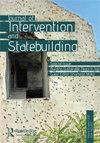国际承认与有限国家领域相遇:2011年后利比亚混合行为者的做法和影响
IF 2.3
2区 社会学
Q1 INTERNATIONAL RELATIONS
引用次数: 1
摘要
本文章由计算机程序翻译,如有差异,请以英文原文为准。
International Recognition Meets Areas of Limited Statehood: Practices and Effects on Hybrid Actors in Post-2011 Libya
ABSTRACT This article examines the impact of international recognition on intrastate conflict contexts and areas of limited statehood. We conceptualise international recognition-through-interaction in social-relational, process-oriented, non-dualistic and performative (practice) terms. We theorise plural effects beyond the government vs. rebels and conflict causation vs. transformation binaries. Based on two case studies on post-2011 Libya’s security/armed and migration governance actors, including original interviews, we show that the most distinctive power of international recognition-through-interaction lies in drawing (sovereignty) lines. Material empowerment effects are prominent, though only contextually subject to formal international recognition. Identity transformation remains partial and political legitimacy is influenced in complex ways.
求助全文
通过发布文献求助,成功后即可免费获取论文全文。
去求助
来源期刊

Journal of Intervention and Statebuilding
INTERNATIONAL RELATIONS-
CiteScore
5.20
自引率
20.00%
发文量
21
期刊介绍:
The Journal of Intervention and Statebuilding is a cross-disciplinary journal devoted to critical analysis of international intervention, focussing on interactions and practices that shape, influence and transform states and societies. In 21st century political practice, states and other actors increasingly strive to transplant what they see as normatively progressive political orders to other contexts. Accordingly, JISB focuses on the complex interconnections and mutually shaping interactions between donor and recipient communities within military, economic, social, or other interventional contexts, and welcomes perspectives on political life of, and beyond, European state-building processes. The journal brings together academics and practitioners from cross-disciplinary backgrounds, including international relations, political science, political economy, sociology, international law, social anthropology, geography, and regional studies. The editors are particularly interested in specific or comparative in-depth analyses of contemporary or historical interventions and state-building processes that are grounded in careful fieldwork and/or innovative methodologies. Multi or cross-disciplinary contributions and theoretically challenging pieces that broaden the study of intervention and state building to encompass processes of decision-making, or the complex interplay between actors on the ground, are especially encouraged.
 求助内容:
求助内容: 应助结果提醒方式:
应助结果提醒方式:


